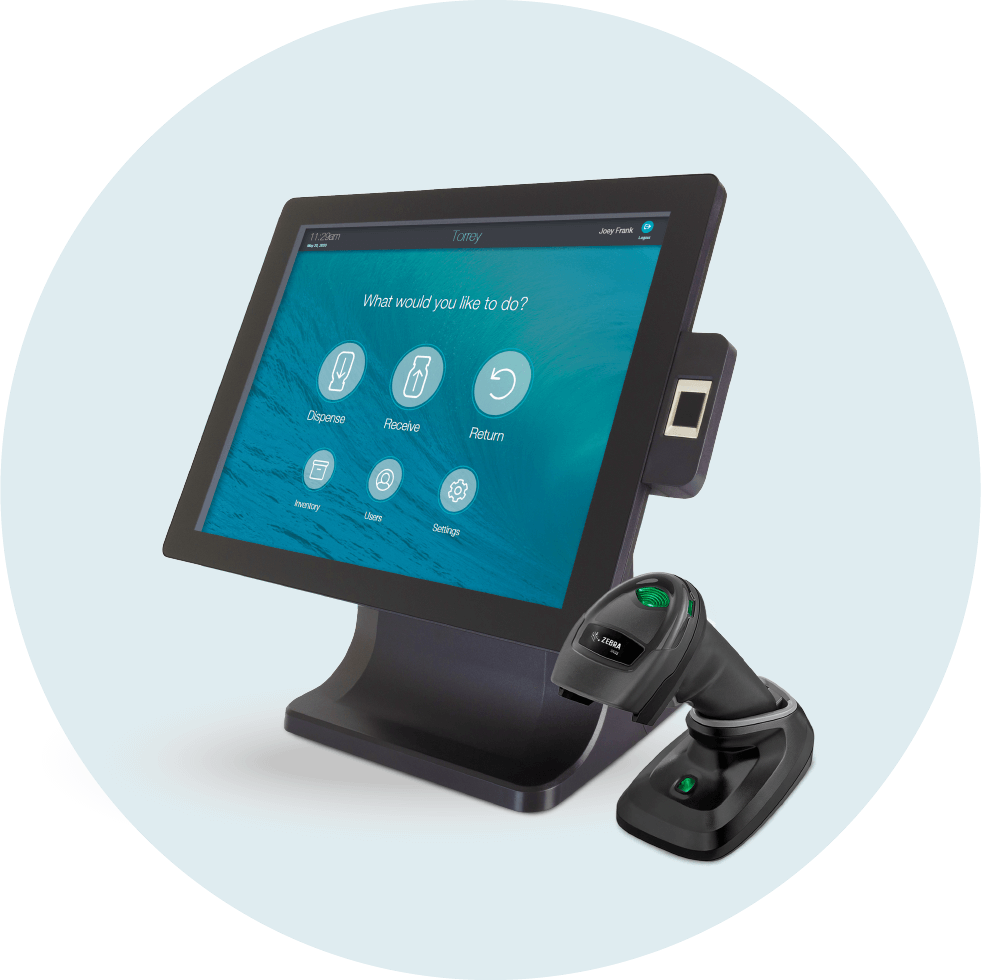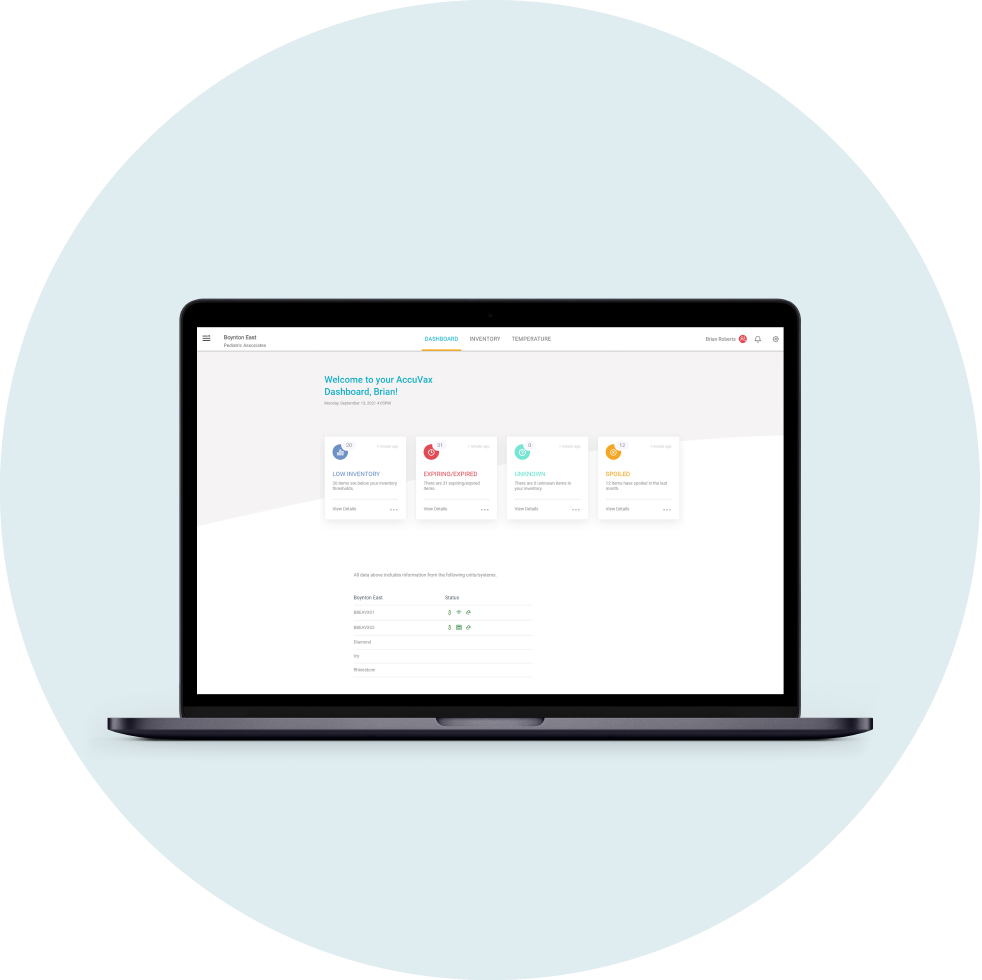*Read our updated Flu Vaccine Refrigeration 2022 Blog here!
Over 90% of vaccines need to be kept within a specific temperature range from the moment they’re manufactured to when they’re administered to a patient, and the influenza (flu) vaccine is no exception. Flu vaccines exposed to temperatures outside their recommended range can lose their efficacy, ultimately reducing the impact of your immunization program and patient confidence in vaccines.
As a busy flu season begins and the coronavirus (COVID-19) vaccine becomes available, your practice is tasked with promoting the importance of vaccinations and easing any patient concerns around immunization. You also need to identify different vaccine brands, determine correct dosages and age requirements, and find the storage space for a large quantity of vials. If your practice is unable to ensure proper flu vaccine refrigeration to keep inventory effective, all your efforts will go to waste — along with valuable vaccines.
Read on to find the answers to the most commonly asked questions about flu vaccine refrigeration to help you ensure an effective immunization program at your practice.

Frequently Asked Questions about Flu Vaccine Refrigeration
What are acceptable units for flu vaccine refrigeration?
The ideal units for flu vaccine refrigeration are pharmacy-grade or stand-alone refrigerators that have been purpose-built for storing vaccines. Household combination units may be used in some cases, but dormitory-style units should never be used.
Does the flu vaccine need to be refrigerated?
Yes. The flu vaccine must be stored in a refrigerator unit at a temperature between 35° and 46°F (2 and 8°C). The vaccine should never be frozen or kept outside of a refrigerator.
What if the flu vaccine is not refrigerated?
If flu vaccines are not refrigerated, have been frozen, or have been affected by a temperature excursion event, they will become less effective and potentially unsafe. Do not administer these vaccines to patients. Instead, document the issue and contact the vaccine manufacturer or your state immunization program for guidance.
We will refrigerate the flu vaccine but we want to use the freezer for storing other vaccines, such as the new COVID-19 vaccines. Can we use a combination unit to store all our vaccines together?
Combination units are not recommended for storing vaccines as they do not ensure even temperatures in both compartments. Do not store vaccines in both the refrigerator and freezer compartments.
The CDC recommends that you only store vaccines in the refrigerator compartment of a combination unit, but do not turn off the freezer compartment as this may also affect the refrigerator temperature. Many combination units use the cold air from the freezer to cool the refrigerator. If you also need to store frozen vaccines, these should be kept in a separate vaccine freezer unit. Before choosing another unit, be clear on the exact temperature requirements of other vaccines, especially in the case of COVID-19 products.
COVID-19 vaccines have been shown to require different temperature ranges depending on the product. These temperatures vary from refrigerated (between 2 and 8°C) through frozen (between -15° and -25°C) to ultra-cold (between -60° and -80°C). As with most vaccines, COVID-19 vaccine storage temperature is essential for vaccine efficacy. Do not store COVID-19 vaccines in a combination unit with other vaccines and make sure any other storage unit meets the correct temperature requirements for the product. You need reliable vaccine cold storage with accurate temperature monitoring and a team of staff that has been trained to store and handle this new vaccine.
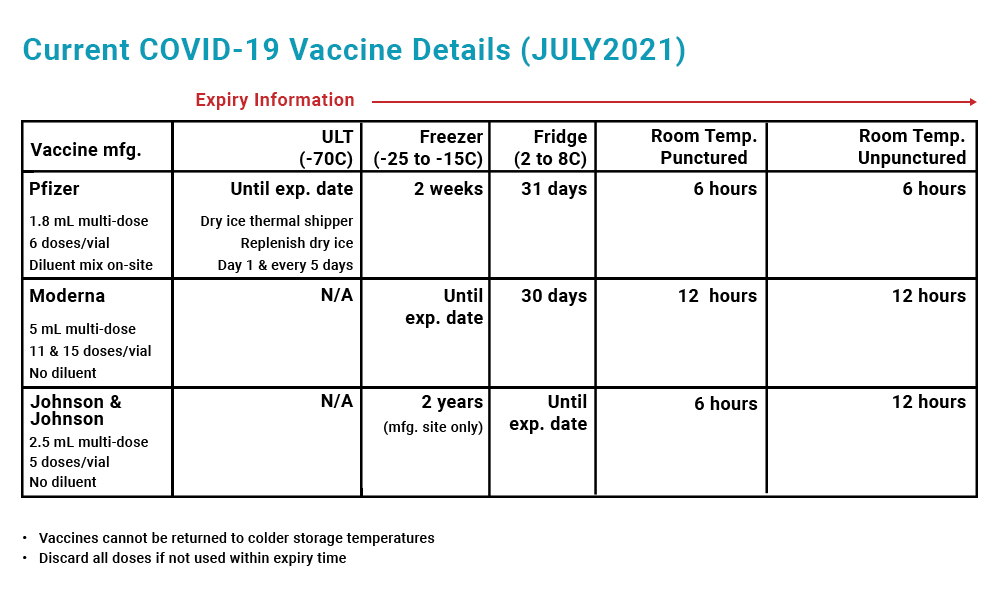 Why can’t we store other items, such as lunches and biological products, in the refrigerator with the flu vaccines?
Why can’t we store other items, such as lunches and biological products, in the refrigerator with the flu vaccines?
The frequent opening and closing of the refrigerator door as you access other items can cause serious temperature excursions which risk flu vaccine efficacy. For this reason, your refrigerator unit should not be overused. Store employee lunches and biological products in a separate refrigerator to the unit you use for flu vaccine refrigeration.
Can we use the top shelf of the refrigerator to store flu vaccines?
Do not store flu vaccines on the top shelf of the refrigerator. Temperatures can vary widely, especially if there is a freezer compartment above the refrigerator with a cold air vent. Always store flu vaccines in the middle of the unit, where the air can circulate and temperatures are the most even.
Unlike household units, pharmacy-grade refrigerators have a fan that circulates the air to ensure more consistent temperatures. Even with these specialized units, you should still avoid using the top shelf to store flu vaccines, as temperatures rise most quickly in this part of the refrigerator during power outages.
If we remove the vegetable bins, can we use this area for flu vaccine refrigeration?
No. This part of a household refrigerator is designed to keep a different temperature to the rest of the unit. Since this part of the refrigerator is usually closest to the motor, it provides an ideal environment for vegetables but certainly not for flu vaccines.
If you wish to put this part of the refrigerator to better use, swap out the vegetable bins for bottles of water. This can help maintain the temperatures within the unit. Be sure to label these bottles so they are not inadvertently consumed.
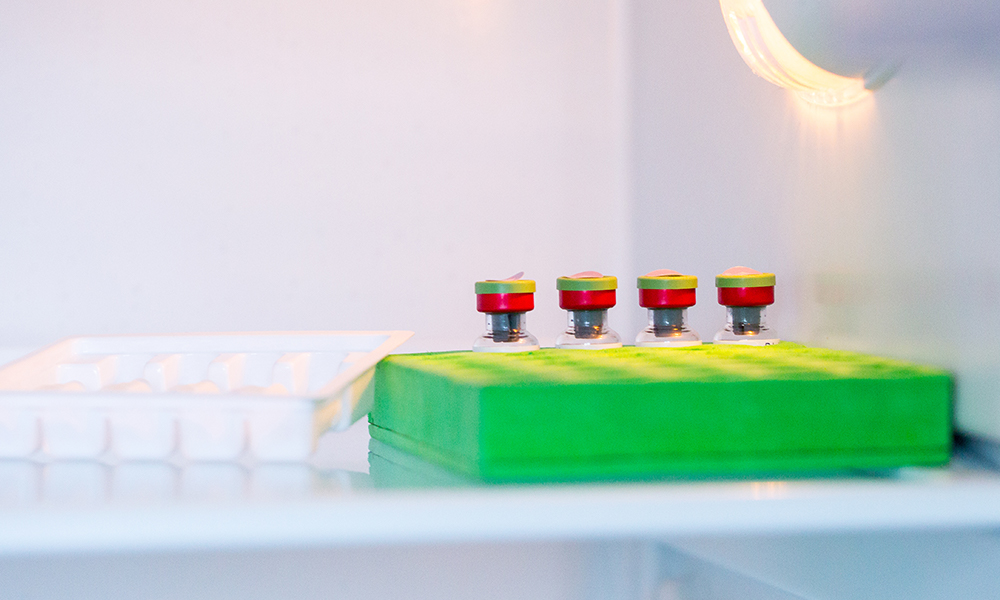
We just bought a new refrigerator for the flu season. How long after installing can we start to use it to store vaccines?
A new refrigerator can take 2 to 7 days before the temperature has stabilized. Use a digital data logger (DDL) or manually check the refrigerator at least twice a day for 2 to 7 days to record the minimum and maximum temperatures. Once you have recorded two consecutive days with the recommended temperature range (35° – 46°F / 2 – 8°C), you can start using the unit for flu vaccine refrigeration.
How often should we log refrigerator temperatures when storing the flu vaccine?
When storing any vaccine, you should log the minimum and maximum refrigerator temperatures at the beginning and end of each day. If the unit does not display the minimum and maximum temperatures, log the current temperature at the beginning and end of each day.
You can also measure the temperature of the room where the refrigerator is kept. In the event of a temperature excursion or refrigerator failure, you will have a better idea of the temperature your vaccines have been exposed to, which can help with the troubleshooting process. Do not use the calibrated temperature monitor from the refrigerator to measure the room temperature, but rather a standard household thermometer.
How long should we keep flu season temperature logs for?
The CDC recommends keeping all your temperature logs for three years. If you are participating in your state’s Vaccines for Children program (VFC), you may be required to retain and provide your temperature logs. By keeping this information, you will also be able to trace any issues with your general vaccine and flu vaccine refrigeration methods. Check with your state or local program to understand your temperature logging requirements.
What steps do we need to take if the refrigerator has an excursion?
As soon as you discover an excursion event, label all of the inventory as “Do Not Use.” You should report the incident to clinic staff and fill out any vaccine storage troubleshooting records used at your practice. Contact the vaccine manufacturer or your local or state health department to determine whether the affected vaccines can still be safely administered to patients or should be disposed of.
Your flu vaccine refrigeration unit should be restored to its proper conditions and the reasons for the temperature excursion should be identified as quickly as possible. If your refrigerator cannot maintain the recommended temperature range for vaccine storage, you should use another unit with more reliable temperature control.
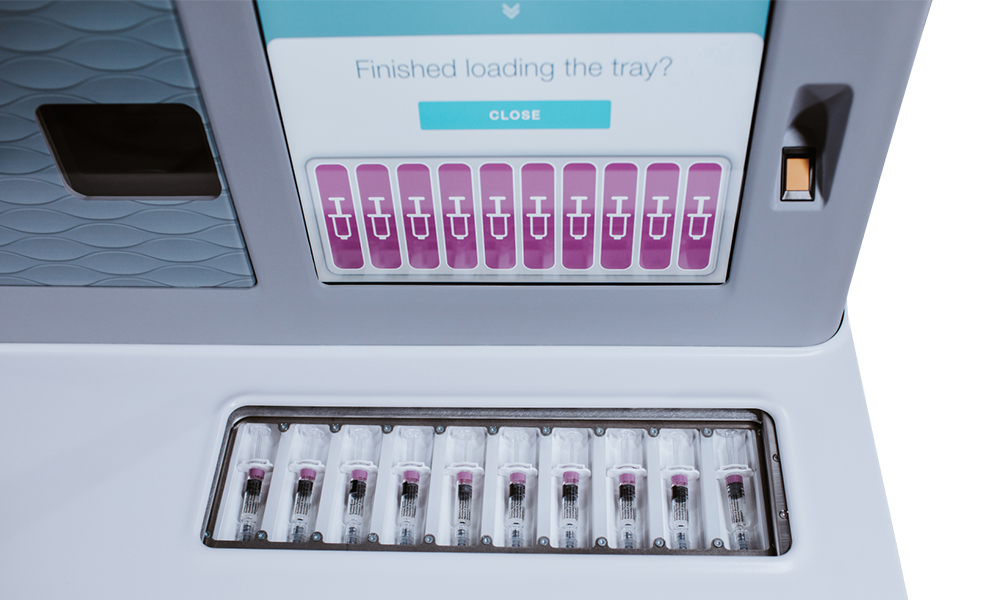
Ensure Ideal Flu Vaccine Refrigeration During the COVID-19 Pandemic
Even if your practice carefully monitors flu vaccine refrigeration and new COVID-19 vaccines, temperature excursions can still occur and damage your vaccine inventory. Only a compliant storage system can remove the costly risks of human error and ineffective equipment. With guaranteed temperature control and constant remote monitoring, the AccuVax Vaccine Management System will keep your flu vaccines and future COVID-19 vaccines at the ideal temperature, without any manual organization or tiresome data-logging.
Unlike dangerous dormitory-style units and unreliable combination units, AccuVax can safely store both refrigerated and frozen vaccines in one spacious unit. The purpose-built, pharmacy-grade system automatically separates vaccines, so you don’t need to worry about storing them incorrectly and letting them go to waste. What’s more, the door-less technology and built-in battery backup eliminate the main causes of temperature excursions and guarantees the protection of all vaccines stored in the AccuVax.
Find out how the AccuVax can support your practice through the busy flu season and COVID-19 vaccine rollout to provide an effective immunization program.




